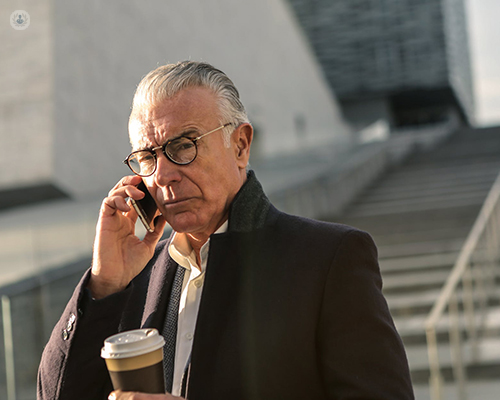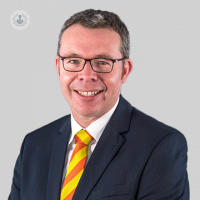Robotic prostatectomy (RALP) for prostate cancer
Escrito por:A robotic-assisted laparoscopic prostatectomy (RALP) is one of the most common procedures used for treating prostate cancer in men in the UK. If you have recently been diagnosed with the disease, your specialist will advise you if you’re a suitable candidate for the operation. Want to know more about RALP? Highly experienced consultant urologist Mr Aidan Noon explains more.

What is a robotic-assisted laparoscopic prostatectomy?
Robotic-assisted laparoscopic prostatectomy (RALP), also called robotic-assisted radical prostatectomy (RARP), is the current state-of-the-art method for surgically treating prostate cancer. In this technique the whole prostate and associated glands are removed, the bladder and urethra (water pipe) are reconnected.
The procedure is a minimally invasive technique known as laparoscopic "keyhole” surgery. Unlike conventional laparoscopic surgery, the instruments are held by a machine (robot) and instrument movements are controlled by the surgeon who is working at a console adjacent to the patient and robot.
When would this surgery be recommended over another type of surgery?
In the United Kingdom, this is the preferred method for surgically removing a cancerous prostate. Other techniques include open radical prostatectomy (where the operation is performed through an incision made below the belly button) or laparoscopic radical prostatectomy. It has superseded open prostatectomy as the patient recovery is superior, there is less blood loss and the surgical view is better.
Robotic-assisted laparoscopic prostatectomy is superior to laparoscopic prostatectomy as the robotic camera and console allow the surgeon to see a three-dimensional view rather than a two-dimensional view and instrument control is superior. There are rare clinical scenarios where a RALP will not be recommended and an open technique will be required
How are patients prepared for surgery?
The preparation for radical prostatectomy is around counselling the patient so that they are aware of what to expect post-surgery. This normally focuses on three areas:
Firstly, patients will need to prepare for some degree of urinary incontinence which will improve over time. Patients are taught how to perform pelvic floor exercises pre-surgery to build up the muscles required to control urination, these exercises will be continued post-operatively to help gain full control of urination. Not all patients will become completely dry, even with pelvic floor exercises - this is less likely with a robotic (RALP) technique.
Secondly, patients will experience a degree of erectile dysfunction that they must be aware of. After surgery, some men will recover “normal” erectile function over time but some men will require medication or other interventions. The superior operating view and decreased bleeding with a robotic (RALP) technique makes it easier to preserve some nerve carrying tissue, which may increase erectile function recovery. Not every patient has cancer where it is safe to try and preserve nerve tissue.
Thirdly, despite surgery, some patients may still require additional cancer treatment at a later date this commonly occurs in two scenarios. In some men cancer has already spread outside the prostate at the time of surgery so not all cancer gets removed by RALP, this is rare with modern imaging and may be predicted by the PSA (prostate cancer blood test).
A more common situation is where cancer has grown through the coat of the prostate and can’t be completely excised. The prostate is surrounded by important structures such as the bladder, rectum and pelvic muscles, so there is a limit to how “wide” the surgeon can go to remove cancer. If cancer is left behind then this can be detected when the prostate is examined by the pathologist (this is called a positive surgical margin), in some instances further curative treatment will be recommended such as radiotherapy.
If you would like to work alongside Mr Noon in your prostate cancer case, you can book an appointment with him via his Top Doctor’s profile here. Can’t visit in person? Mr Noon is available for a video call using our e-Consultation tool, which is also found on his profile.


